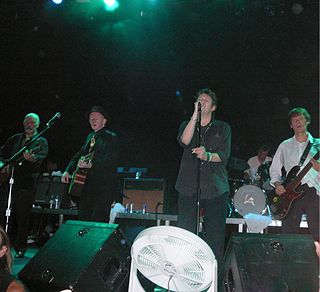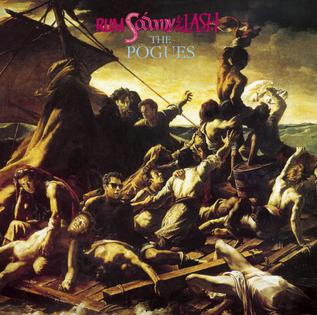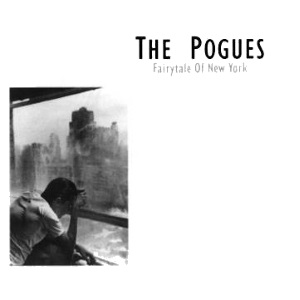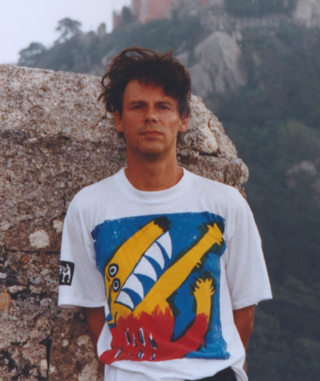Related Research Articles

The Pogues were an English or Anglo-Irish Celtic punk band fronted by Shane MacGowan and others, founded in King's Cross, London in 1982, as "Pogue Mahone" – the anglicisation of the Irish Gaelic póg mo thóin, meaning "kiss my arse". The band reached international prominence in the 1980s and early 1990s, recording several hit albums and singles. MacGowan left the band in 1991 owing to drinking problems, but the band continued – first with Joe Strummer and then with Spider Stacy on vocals – before breaking up in 1996. The Pogues re-formed in late 2001, and played regularly across the UK and Ireland and on the US East Coast, until dissolving again in 2014. The group did not record any new material during this second incarnation.

Stiff Records is a British independent record label formed in London, England, by Dave Robinson and Jake Riviera. Originally active from 1976 to 1986, the label was reactivated in 2007.

Shane Patrick Lysaght MacGowan is an Irish singer-songwriter. He is best known as the lead singer and songwriter of Celtic punk band the Pogues. He was also a member of the Nipple Erectors and Shane MacGowan and the Popes, as well as producing his own solo material and collaborating with artists such as Kirsty MacColl, Joe Strummer, Nick Cave, Steve Earle, Sinéad O'Connor, and Ronnie Drew.

The Dubliners were an Irish folk band founded in Dublin in 1962 as The Ronnie Drew Ballad Group, named after its founding member; they subsequently renamed themselves The Dubliners. The line-up saw many changes in personnel over their fifty-year career, but the group's success was centred on lead singers Luke Kelly and Ronnie Drew. The band garnered international success with their lively Irish folk songs, traditional street ballads and instrumentals. The band were regulars on the folk scenes in both Dublin and London in the early 1960s, and were signed to the Major Minor label in 1965 after backing from Dominic Behan who was paid by Major-Minor to work with the Dubliners and help them to build a better act fit for larger concert hall venues. The Dubliners worked with Behan regularly between 1965 and 1966; Behan wrote numerous songs for this act including the song McAlpine's Fusiliers created specifically to showcase Ronnie Drew's gravel voice. They went on to receive extensive airplay on Radio Caroline which was part owned by Phil Solomon CEO of Major Minor, and eventually appeared on Top of the Pops in 1967 with hits "Seven Drunken Nights" and "The Black Velvet Band". Often performing political songs considered controversial at the time, they drew criticism from some folk purists and Ireland's national broadcaster RTÉ had placed an unofficial ban on their music from 1967 to 1971. During this time the band's popularity began to spread across mainland Europe and they appeared on The Ed Sullivan Show in the United States. The group's success remained steady right through the 1970s and a number of collaborations with The Pogues in 1987 saw them enter the UK Singles Chart on another two occasions.
"Star of the County Down" is an Irish ballad set near Banbridge in County Down, Ireland. The words are by Cathal MacGarvey (1866–1927) from Ramelton, County Donegal. MacGarvey's song was first collected in Herbert Hughes Irish Country Songs. The tune is traditional, and may be known as "Dives and Lazarus" or "Kingsfold".

Rum Sodomy & the Lash is the second studio album by the London-based folk punk band The Pogues, released on 5 August 1985. The album reached number 13 on the UK charts. The track "A Pair of Brown Eyes", based on an older Irish tune, reached number 72 on the UK singles chart. "The Old Main Drag" later appeared on the soundtrack to the film My Own Private Idaho.

If I Should Fall from Grace with God is the third studio album by Irish folk-punk band the Pogues, released on 18 January 1988. Released in the wake of their biggest hit single, "Fairytale of New York", If I Should Fall from Grace with God also became the band's best-selling album, peaking at number three on the UK Albums Chart and reaching the top ten in several other countries.

"Fairytale of New York" is a song written by Jem Finer and Shane MacGowan and recorded by their London-based band the Pogues, featuring singer-songwriter Kirsty MacColl on vocals. The song is an Irish folk-style ballad and was written as a duet, with the Pogues' singer MacGowan taking the role of the male character and MacColl the female character. It was originally released as a single on 23 November 1987 and later featured on the Pogues' 1988 album If I Should Fall from Grace with God.
Celtic rock is a genre of folk rock, as well as a form of Celtic fusion which incorporates Celtic music, instrumentation and themes into a rock music context. It has been extremely prolific since the early 1970s and can be seen as a key foundation of the development of highly successful mainstream Celtic bands and popular musical performers, as well as creating important derivatives through further fusions. It has played a major role in the maintenance and definition of regional and national identities and in fostering a pan-Celtic culture. It has also helped to communicate those cultures to external audiences.

Philip Ryan, professionally known as Philip Chevron, was an Irish singer-songwriter and guitarist and record producer. He was best known as the lead guitarist for the celtic punk band The Pogues and as the frontman for the 1970s punk rock band The Radiators from Space. Upon his death in 2013, Chevron was regarded as one of the most influential figures in Irish punk music.
Caitlín O'Riordan is a British musician of Irish and Scottish descent. She played bass guitar for the Irish punk/folk band the Pogues from 1983 to 1986. She later played with Elvis Costello as well as several other projects. She uses the name Rocky O'Riordan on social media and for her Sirius-XM radio show, The Rocky O'Riordan Show.
The Radiators from Space, also known as The Radiators, The Rads, Radiators (from Space), and The Radiators Plan 9, were an Irish punk rock band. They have been described as Ireland's first punk band. Initially active 1976-1981, the band had a brief reunion in 1987-1988, and reformed in 2003 until the death of founding member Philip Chevron in 2013, with remaining members continuing as Trouble Pilgrims.

Peter Richard "Spider" Stacy is an English musician, singer, songwriter, and actor. He is best known for playing tin whistle and sometimes singing for The Pogues.

James Fearnley is an English musician. He played accordion in the Celtic punk band The Pogues.

"The Auld Triangle" is a song by Dick Shannon, often attributed to Brendan Behan, who made it famous when he included it in his 1954 play The Quare Fellow. He first performed it publicly in 1952 on the RTE radio programme 'The Ballad Maker's Saturday Night', produced by Mícheál Ó hAodha. Behan's biographer, Michael O'Sullivan, recorded, 'It has been believed for many years that Brendan wrote that famous prison song but Mícheál Ó hAodha says he never laid claim to authorship. Indeed he asked him to send a copyright to another Dubliner, Dick Shannon.' When he recorded the song for Brendan Behan Sings Irish Folksongs and Ballads, Behan introduced it with these words: 'This song was written by a person who will never hear it recorded, because he's not in possession of a gramophone. He's ... he's ... pretty much of a tramp.'

The Mahones are a Canadian Irish punk band, formed on St. Patrick's Day in 1990, in Kingston, Ontario.
"The Irish Rover" is an Irish folk song about a magnificent though improbable sailing ship that reaches an unfortunate end. It has been recorded by numerous artists, some of whom have made changes to the lyrics over time.

Darryl Gatwick Hunt was an English musician and singer-songwriter, who was best known for playing bass guitar in The Pogues.

Poguetry in Motion is an EP by The Pogues, released on Stiff Records in the UK on 24 February 1986, and in the US & Canada on MCA Records. It was the band's first single to make the UK Top 40, peaking at number 29 and the first Pogues recording to feature Philip Chevron and Terry Woods.
Ron Kavana is an Irish singer, songwriter, guitarist and band leader. Born in the County Cork town of Fermoy, he is the son of an Irish father and an American mother from Chicago with Cajun roots.